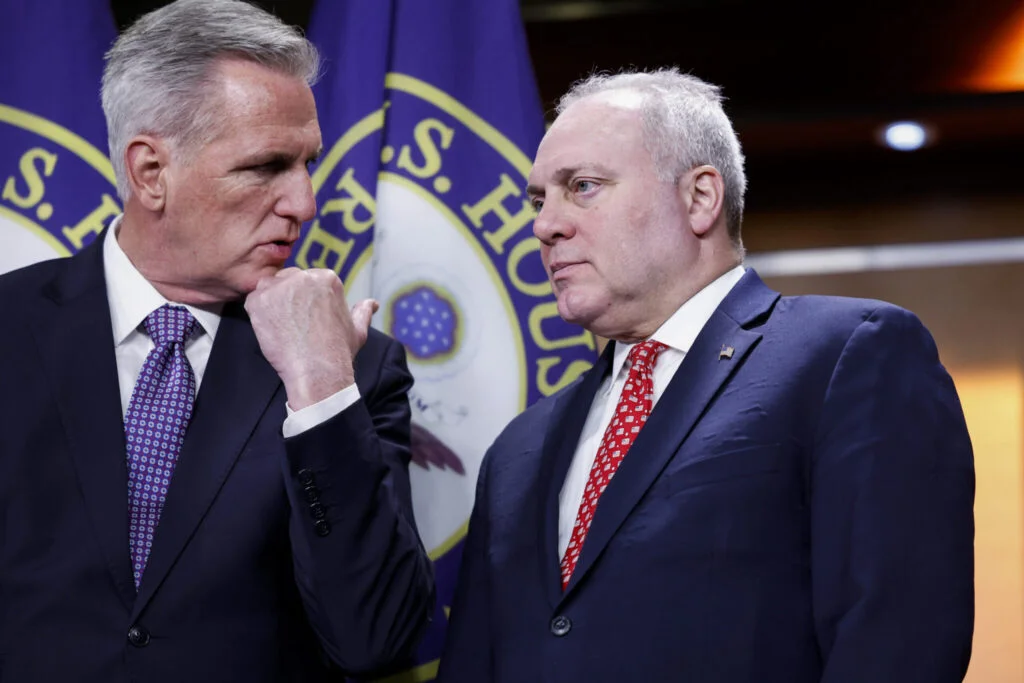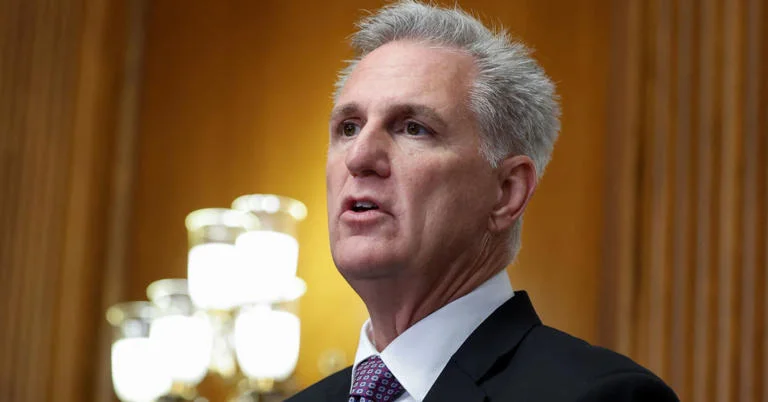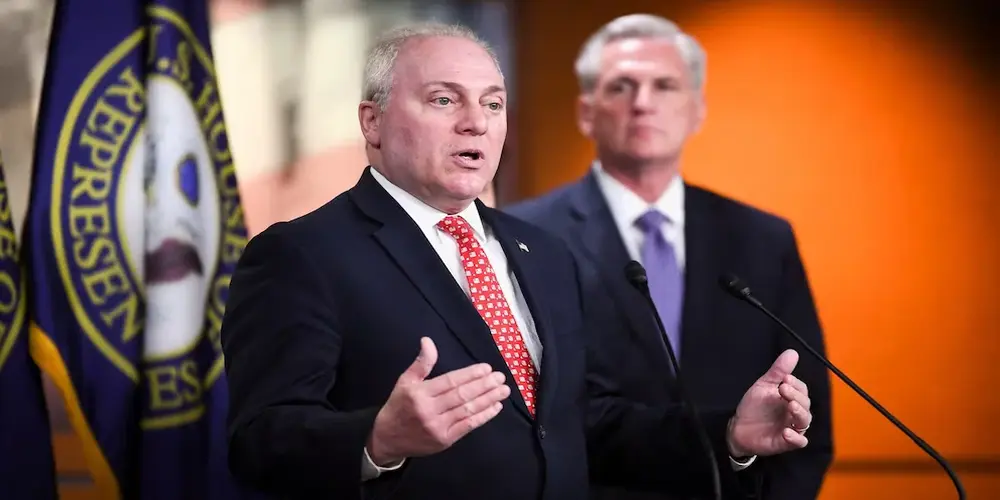The House Republican Party finds itself mired in deepening disarray as it grapples with internal divisions regarding the selection of its next speaker. Ironically, this ongoing feud is contributing to a perception of dysfunction within the US government at a time when global crises are worsening.
While GOP lawmakers did nominate Steve Scalise for the role, which is second in line for presidential succession; on a Wednesday, it became evident by nightfall that the Louisiana Republican and the current majority leader was facing a significant challenge in securing the votes necessary for the speakership during a floor vote.

Steve Scalise, R-La., speaks at the House GOP news conference after the House Republicans' meeting in the Capitol
“One Republican member said, ‘Steve is nowhere near 217’, referring to the number of votes Scalise would need on the floor to become the speaker”, wrote CNN. However, skepticism also exists regarding the Judiciary Chairman Jim Jordan, who was the runner-up in the closed-door election on Wednesday. Doubts linger about his ability to unify the party and secure the top position, which may create an opening for a compromise candidate, although the identity of such a candidate remains to be determined.
The ongoing turmoil within the House GOP follows the recent ousting of former Speaker Kevin McCarthy, who faced a no-confidence vote by eight Republicans are voting with Democrats.
In theory, Steve Scalise is poised to become the most powerful Republican in Washington. However, even if he manages to secure the necessary votes, he risks compromising his potential speakership by concessions to the party’s far-right elements.
This scenario parallels the challenges that Kevin McCarthy faced during the 15 rounds of balloting required for him to secure the speakership in January, ultimately leading to his ouster last week.
Furthermore, there are indications of growing discord within the party regarding the majority leader position, which could become available if Scalise assumes the speakership. Multiple candidates, including Representatives Tom Emmer of Minnesota, Kevin Hern of Oklahoma, and Byron Donalds of Florida plan to run for the majority leader role. However, some GOP leaders are frustrated that this competition distracts from the urgent task of selecting a speaker.
When Scalise pulled ahead of Jordan in a vote of 113 to 99 on Wednesday, the magnitude of his challenge became evident. He still needed to catch up to the 217 votes needed to claim the speakership on the floor. This means that he can only afford to lose four votes within a GOP conference that has gained notoriety for its divisive politics, internal discord, and chaos.
“We still have work to do”, Scalise conceded to reporters, a notably understated statement as he entered meetings with members who had declined to endorse him but often struggled to articulate their specific demands. This situation reflects the broader tendencies of the GOP in the post-Trump era, which has become more adept at undermining institutions than effectively governing.
Scalise dedicated the night following his narrow lead to build a majority that could secure his speakership. Nevertheless, several conference members have stated their intention to vote for Rep. Jim Jordan, even though the hardline Ohio Republican has promised to nominate Scalise for the speakership ahead of a House vote. Party leaders hope this vote will take place on Thursday but cannot guarantee it.

House GOP follows the recent ousting of former Speaker Kevin McCarthy, who faced a no-confidence vote by eight Republicans are voting with Democrats
The turmoil within the GOP following McCarthy’s removal, underscores the challenges posed by the party’s slim majority achieved in the midterm elections and the deep internal divisions that render the GOP conference virtually unmanageable. This power vacuum sends a message of incompetence to moderate voters in swing districts, a demographic crucial for the GOP’s efforts to retain control of the House in 2024. Additionally, the GOP’s inaction during a time of global crisis following the Hamas incursion into Israel bolsters arguments made by adversaries who claim that US power is diminishing.
“This is an act of terror. It cannot stand.” – Foreign Affairs Committee Chairman – @RepMcCaul on the barbaric terrorist attacks in Israel. pic.twitter.com/tPC4le6rAN
— House Republicans (@HouseGOP) October 11, 2023
“We need to govern, and we can’t govern without a speaker”, emphasized Texas Rep. Michael McCaul, chair of the Foreign Affairs Committee. He urged his fellow Republicans to avoid further delay in selecting a speaker, emphasizing that such delays only embolden adversaries such as Chairman Xi of China, who critiques the functionality of democracy and Putin, who benefits from the GOP’s internal strife.
Steve Scalise’s Treacherous Path to Victory:
Steve Scalise is no stranger to adversity. He made a remarkable recovery from grievous injuries sustained during a shooting at a congressional baseball practice in 2017 and has recently received treatment for blood cancer.
However, Scalise must navigate a path filled with challenges to establish a sustainable speakership. Scalise must avoid the pitfalls leading to McCarthy’s downfall to secure the speakership. McCarthy granted concessions to hardliners that enabled a single member to call a vote to oust him, resulting in his removal. While Scalise is considered more conservative and popular than McCarthy is within the GOP conference and is recognized as a formidable fundraiser; it’s unclear how he can address the concerns of holdouts who ultimately turned against McCarthy.
While McCarthy had two primary red lines—a refusal to trigger a US debt default and government shutdown—both scenarios appeared inevitable in recent months, leading McCarthy to collaborate with Democrats to pass a stop-gap measures. This strategy proved to be detrimental to his speakership. His attempts to appease far-right elements in the party had no discernible effect, even after inserting conservative culture war priorities into appropriations bills, expelling prominent Democrats from key committees, and initiating an impeachment inquiry into President Joe Biden.
High-profile rebel Republicans expressed reservations about voting for Scalise, and it was evident that he lacked the necessary votes for victory. Georgia Rep. Marjorie Taylor Greene, who had built a political connection with McCarthy, a fervent Trump supporter aligned with Jordan’s views, voiced concerns about Scalise’s health. South Carolina Rep. Nancy Mace initially hesitated to vote for Scalise and cited a speech he delivered to a White supremacist group founded by former Ku Klux Klan grand wizard David Duke.
Although Scalise later regretted the speech, Mace had difficulty reconciling this incident. Scalise may also face resistance as he is perceived as a member of the GOP establishment, while the party increasingly celebrates outsiders and insurgents. He was unable to secure the support of another hardliner, Rep. Lauren Boebert of Colorado, despite a private meeting. Boebert argued that Scalise should prioritize reforming the House’s operations, suggesting leadership issues within the GOP conference.
As Wednesday evening progressed, senior Republicans grew more pessimistic about Scalise’s prospects for securing the necessary votes. One top House Republican, speaking anonymously, stated, “He has no path to 217”, emphasizing the challenging road ahead for Scalise.
A Backlash Against Hardliners:
The ongoing situation has frustrated mainstream Republicans who won crucial districts in the past year, leading to the GOP’s majority. Their reelection campaigns will determine the future of the House next year.
Rep. Mike Lawler of New York expressed his frustration that a few members had repeatedly disregarded the “majority of the majority”, leading to McCarthy’s removal. He argued for accountability for the extremists who voted out McCarthy, emphasizing that rearranging leadership would not resolve the problem or address the issues within the party. He highlighted that McCarthy’s removal happened with the support of 208 Democrats, underscoring the complexities and internal divisions the GOP conference is grappling with.
The ongoing chaos within the Republican conference reflects the party’s struggle to govern effectively. Despite securing a slim majority in the midterm elections, the GOP faces immense difficulties in aligning its goals with legislative reality. Even if Scalise manages to secure the speakership, he will inherit the same intractable issues that led to McCarthy’s downfall. These problems include the looming possibility of a government shutdown in the coming month.
Laura Blessing, a senior fellow at Georgetown University’s Government Affairs Institute pointed out that the new speaker’s challenges will be just as intractable as those that McCarthy still needs to overcome. The new speaker will inherit the pending matters left by their predecessor. The GOP’s internal strife also sends a troubling message to the American people and the international community. It underscores the party’s inability to manage internal dynamics and legislate responsibly and effectively. This dysfunction damages the GOP’s credibility, particularly in the eyes of moderate voters in swing districts. The continued power vacuum within the GOP further exacerbates the situation.
The neglect of critical governance during a global crisis, such as the recent Hamas incursion into Israel, has international implications. Leaving the House chamber empty during these moments feeds into the narrative that the United States is losing its influence and power on the world stage.
Adversaries like China’s Chairman Xi and Russia’s Putin use such instances to criticize the effectiveness of democratic governance. This international perception of dysfunction and instability could undermine American global leadership.
In conclusion, the House GOP’s turmoil over the speakership is not just an internal party issue but has significant implications for governance, the party’s future, and America’s standing on the world stage. The power struggles and internal divisions within the GOP threaten to hinder effective governance at a time when pressing domestic and international challenges demand strong leadership. How the GOP resolves its leadership crisis will determine the party’s direction and impact the nation’s ability to address critical issues at home and abroad. The ongoing chaos within the GOP remains a matter of concern, with its consequences extending beyond party politics.
As the House GOP navigates these challenges, it faces a pivotal moment in defining its future and its role in shaping the nation’s destiny. It remains to be seen whether Steve Scalise can rally the necessary support to secure the speakership and, if successful, whether he can overcome the deep divides within the party to provide effective leadership. The decisions made in the coming days will shape the trajectory of the GOP and influence the nation’s ability to respond to its most pressing challenges.




